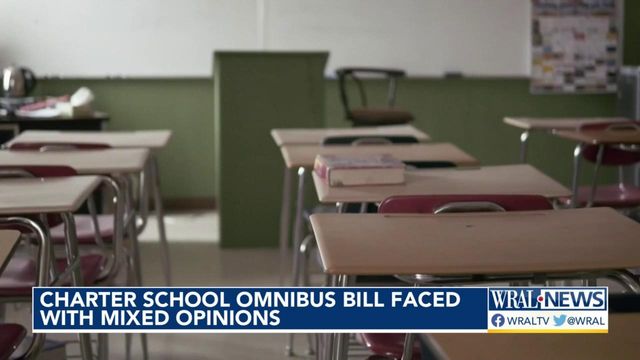NC bill would allow charter schools to dip into more district funding
A North Carolina bill - pegged the “Charter School Omnibus Bill” - has caught the attention of several public school boards across the state.
Many stakeholders specifically have their sights on section VII of House Bill 219, which discusses a potential change in funding structure. It would allow charter schools to dip into more district funding.
District schools already share money with charter schools. However, there are certain funds that districts do not have to share, such as grants.
“What we're trying to do here, simply, is level the playing field,” said Rhonda Dillingham, the executive director of the North Carolina Association for Public Charter Schools.
Dillingham said the money should follow the student, should their family choose a charter school, which echoes the language used in the bill.
“If a student attends a charter school, the local school administrative unit in which the child resides shall transfer to the charter school an amount equal to the per pupil share of the local current expense fund of the local school administrative unit for the fiscal year,” it reads.
North Carolina has seen substantial growth in its charter school attendance, growing by more than 19% from 2019 to 2022, according to the North Carolina Department of Public Instruction. As charter schools see a boom in growth, Dillingham said those students deserve to have proper funding for their education.
“Money is meant to educate children, not support or prop up systems. The money does not belong to the district,” she said. “We are in the business of educating students in this state. No one student should be worth less than another.”
Those opposed to the bill say that they also believe the funding should be fair and equal. However, they argue the current structure is both of those things.
Bruce Mildwurf is the director of governmental relations for the North Carolina School Boards Association.
“We believe every student should have the same per-pupil amount of local tax dollars, no matter what school they go to, “ Mildwurf said. “This bill significantly tilts the scales in favor of the charter schools.”
Mildwurf said, if approved, this bill would ultimately hurt the students in traditional public schools.
“That is money out of the classroom; it is fewer teachers; it is fewer resources. Charters are benefiting at the expense of district-wide students,” he said.
Several school districts in North Carolina have publicly opposed the bill, or at least discussed it. That includes Charlotte-Mecklenburg, Granville and Chatham counties’ school boards.
“School boards want fair funding. We currently have fair funding. This bill is unfair funding and will take millions of dollars away from school districts each year,” Mildwurf said.
The Granville County school board discussed HB 219 multiple times during public meetings. A resolution was introduced to publicly oppose the bill. In that resolution, it lays out several funds that would be stake, if the bill passes:
“by deleting the list of protected funds, House Bill 219 creates unequal rather than equal local funding for K-12 education, including but not limited to, the following revenues:
- Fund Balance: Charter schools do not have to share their savings account (i.e., Fund Balance) with local school districts. This is money saved by local school districts from prior years during which eligible revenues were already shared with charter schools. "Sharing" such funds a second time would be double-dipping and a windfall to charter schools at the expense of local school district students;
- Federal Reimbursements: Charter schools do not have to share any federal reimbursements with local school districts. By law, many federal programs require schools to spend unrestricted revenues on specific purposes before getting reimbursed that amount by the federal government. Thus, no new money is received and any unrestricted revenues used for the federal program derive from funds that have already been shared with charter schools. "Sharing" such funds a second time would be double-dipping and a windfall to charter schools at the expense of local school district students;
- Pre-K Classroom Funds: Charter schools can apply for these funds directly and they do not have to share them with a local school district. By law, NC Pre-K dollars and Smart Start dollars cannot be given to charter schools directly by a local school district. Thus, if HB 219 passes school districts would be forced to use even more unrestricted local dollars to pay charter schools a proportionate share of these funds, resulting in charter school students getting a higher amount of K-12 dollars simply because the local school district chose to assist the community by operating one or more Pre-K classrooms – whether or not the charter schools even choose to operate a pre-K classroom or serve any pre-K students from Granville County. "Sharing" such funds a second time would be double-dipping and a windfall to charter schools at the expense of local school district pre-K students;
- Tuition and Fees for Actual Costs: If a charter school chooses to allow public use of its facilities, operate a summer program, before school program, or after school program it can charge fees that are not shared with the local school district. Local school districts charge such fees to cover the additional costs of facility use and/or extra programming because these activities are beyond the normal operating costs for K-12 education. "Sharing" such funds would be a windfall to charter schools at the expense of local school district students; and
- Sales Tax Refunds: Charter schools are reimbursed 100% of state and local sales tax amounts they pay and do not have to share these funds with local school districts. Local school districts only receive a reimbursement of local sales tax amounts paid by the school district. This is another reimbursement. "Sharing" such funds a second time would be doubledipping and a windfall to charter schools at the expense of local school district students.”
It says the financial impact would be “devastating.”











